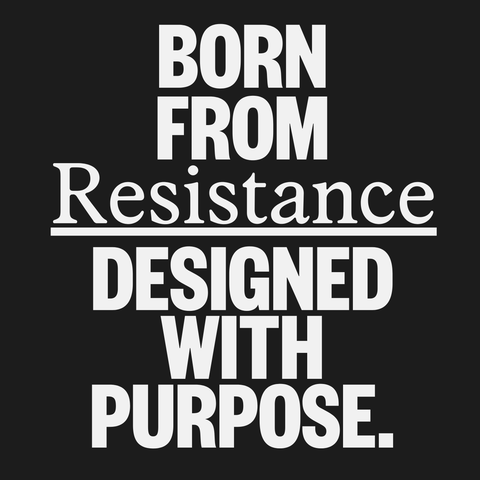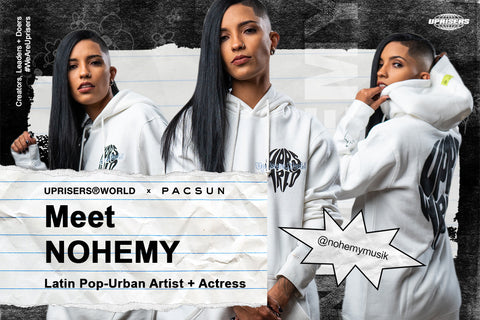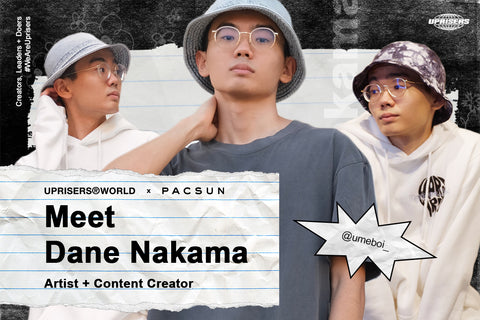We spoke to the actress, Youtuber, and digital creative on diversity, representation and creativity.
UPRISERS: How and when did you start collaborating with UPRISERS and founder Michelle K. Hanabusa?
Asia Jackson: The first time I met her actually was three weeks before we launched the collection. So I met her in Oct. 2019.
My manager is really good friends with Michelle, and he introduced me to her. He thought that what she was doing with UPRISERS really aligned with what I wanted to do in the activism space and what I was doing with #MagandangMorenx. It was like the perfect partnership. I love what UPRISERS is doing. It totally aligns with what I love to do.
It's funny because we wanted to do a collection for October, which is Filipino American Heritage Month, but we met like the last week of September over Zoom because she was in Tokyo at the time. It was really crazy the way that we managed to pull this together. But it ended up being really cool and awesome.
What did the creative process look like?
We collaborated with another Asian American artist Sophia Chang. She's done a lot of cool work with Nike, Adidas, and other really cool brands. She was gracious enough to give her time and a really great rate for her time to design some of the stuff for our collection. Then when it came to the actual designing of the T-shirt and the hoodie, Michelle and I collaborated very closely on that. I sent her ideas that I thought would be really cool, then she kind of dialed it in with her graphic design experience in her fashion and merchandizing. This is the first collection I have ever done, so working with Michelle was really great because it felt almost like a mentorship. I'm really, really grateful that I was able to work with her because I learned so much from her and I continue learning so much from her.
Did you have a set vision for the collaboration or did you go with the flow?
It was kind of both at the same time, if that makes sense. I knew that I wanted the campaign to be as diverse as possible. I grew up in Long Beach, which is a very diverse city. I asked my friends to participate in the campaign with me. I chose a lot of people who were considered dark skinned in their respective cultures, which was really important for me. I chose a lot of mixed people because, you know, "you can't tell me who I am" messaging plays into my mixed identity.
I just got a lot of people who I felt would fit really well with what UPRISERS stands for. I was really intentional on who I wanted to be in the campaign.

With the political climate last year, what were your initial thoughts when you heard of Hate Is A Virus?
I'm very visibly black; I'm not very visibly Asian especially in a Western view. I just don't look Asian to a lot of white people and to a lot of Western people. So I was not personally affected by all of the rising hate crimes against Asian people in the United States. But I do have a lot of friends who were affected.
So Hate Is A Virus is a campaign that I really wanted to get involved in because I wanted to push back. I thought it was a really great message. I wanted to really raise awareness and give voice to the people who are most affected by it.
I think the money that they raised for small businesses was so awesome. That's what I love about working with UPRISERS, they do really important things like that.
What do you look forward to the most with this launch?
I think well, first of all, I'm very, very proud of Michelle. I'm so excited for her. I think this is such an incredible opportunity.
I'm just really excited to see diverse storytelling. I feel like PacSun, when I was growing up as a teenager, they were really into the street and skate culture, which is really a huge part of Southern California in general. But I'm really excited to see a lot more diverse storytelling within those subcultures. So that's definitely what I'm most excited about with this collaboration. I'm excited to see more diverse faces in campaigns.
What does representation as an emphasis on this launch mean to you?
I'm really excited because one of the biggest reasons why I wanted to have a platform, why I wanted to be in entertainment, why I wanted to start a YouTube channel, why I started #MagandangMorenx, why I do everything that I do with my platform is because I wanted to be the representation that I didn't have when I was younger. And so to continue being part of these sort of launches and things like that is really important to me. It totally aligns with my purpose. It's very fulfilling work. It's a way that they [younger generations] to see themselves be part of a culture that they already know that they're part of.
Why is diversity important?
At the same time, I think it's really important not only representation in media but representation in positions behind the scenes. It's important to see women CEOs of color, female producers of color in television, and female show runners of color. Diversity and inclusion behind the scenes is just as important as on screen. And that's what true inclusion means to me. It's more about the optics than it is about like actual inclusion, so I think, you know, seeing diverse faces and voices in higher positions and positions behind the scenes, that's how you really get like a fuller story.







